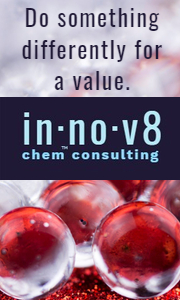 Even when you think you have a well-designed process, if the chemistry gods don’t smile upon you, things can quickly go awry. Here are some examples to illustrate ways to cope with chemistry and polymer problems.
Even when you think you have a well-designed process, if the chemistry gods don’t smile upon you, things can quickly go awry. Here are some examples to illustrate ways to cope with chemistry and polymer problems.
Patented Does Not Mean Problem Free
I took on a project for a very large chemical company. The team spent many years developing and patenting a process to make their new polymer and had begun development on a new facility to house the manufacturing unit. The process often ran well for a few hours, then would gum up and produce garbage for a while before returning to smooth operation. I identified that the company’s patented chemistry was actually the cause of the problem. Two species in the mixture were forming a product that was not soluble at the elevated process temperatures, and when a sufficiently large mass of crystals deposited on the machinery, these crystals would break off to make contaminated product. Once the crystals were purged from the system, the process would once again operate well until the next crystal buildup. I changed the composition of the mix to eliminate the insoluble crystals and the cyclic negative behavior of the process ceased, which in turn eliminated waste and increased productivity.
Measurements and Mixtures
A small engineering firm asked me for help with its chemistry and polymer problems. The company’s process was simple and when it worked, it worked beautifully. However, when it didn’t work well, the product failed completely. After observing the process and investigating further, I was able to show that the variability was rooted in two aspects of the technology: a) the ratio of two key reactants was not controlled, and b) the agitation of the materials was not sufficient to obtain a uniform mixture. The fix for these conditions, control of the reactant ratio and good mixing, is currently in progress with the initial results showing great promise.
These two examples are representative of many problems I have seen in the industry. In some cases, the problems come from not having sufficient chemistry experience on the team. But even in the case of larger companies with strong chemistry expertise, problems can arise when scientists are too invested in the details of the project to see the full picture. If you find that your company is seeing repeated failures with materials and processes, the best way to cope with chemistry issues on this level is to hire an expert to offer outside analysis and a fresh perspective. At Innov8 chem, our PhD experts have real-world industry experience solving these types of chemistry and polymer problems. Give us a call for a free initial consultation to see how we can help you cope with your chemistry and polymer problems.



